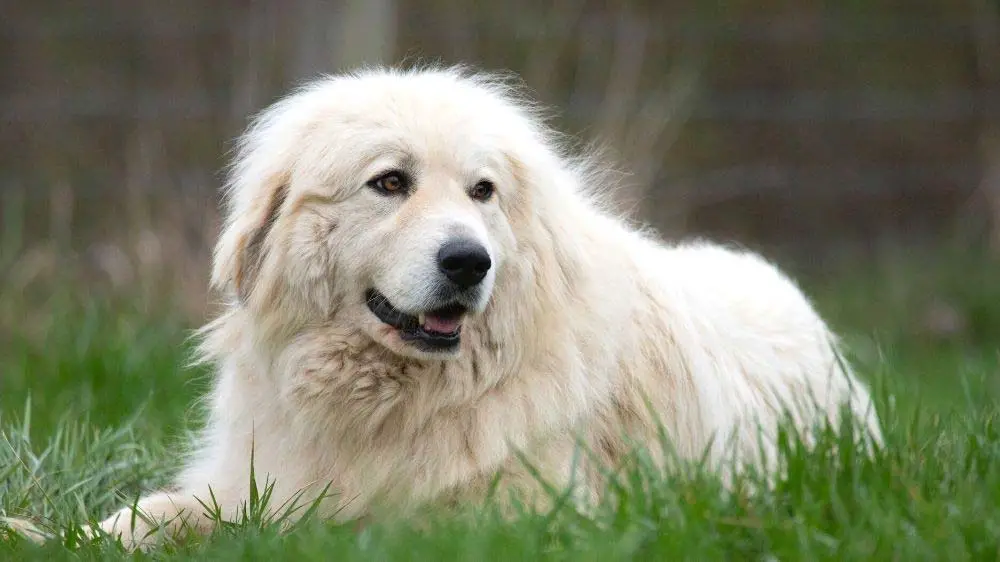Golden retrievers are some of the most popular dogs in the United States due to their loyal and friendly nature. Great Pyrenees might not be as well-known, but their willingness to bond and build a loyal relationship makes these gentle giants an excellent choice for many potential pet owners. But which is the better dog, Great Pyrenees or Golden retriever?
The Great Pyrenees is the better dog as it is much calmer, a better guard dog, and requires far less grooming and exercise. However, Golden retrievers are more loving and accepting of new people, require less food, and are easier to train. Both dogs live up to 12 years and blend well with families.
This article will discuss the various differences between these dogs, including their physical characteristics, training suggestions, grooming needs, and more. We’ll also cover which one will make the better family pet and the health conditions you might encounter with each.

(This article may contain affiliate links and loyalgoldens may earn a commission if a purchase is made.)
Unlock your goldens natural intelligence and see just how quickly problem behaviors disappear.This is the best at home dog training I've ever used!
Great Pyrenees vs. Golden Retriever: Basic Overview
The Great Pyrenees and the Golden retriever are both light-colored, large breed dogs, and it’s not uncommon to see people mistake one breed for the other.
Though both have a similar life expectancy, the average Great Pyrenees is somewhat larger than a typical golden. In the table below, you’ll see how each breed compares when looking at the standards for adult dogs.
| Trait | Golden Retriever | Great Pyrenees |
| Expected Lifespan | 10 to 12 years old | 10 to 12 years old |
| Average Weight | 55 to 75 pounds (24.95-34.02 kg) | 85 to 100+ pounds (38.56-45.36+ kg) |
| Average Height | 21.5 to 24 inches (54.61-60.96 cm) | 25 to 32 inches (63.50-81.28 cm) |
(Sources: American Kennel Club & AKC)
Size isn’t the only place that these two dogs differ. From their personalities and grooming needs to their temperament and overall health, there are a few key differences to keep in mind when choosing between the two.
Let’s take a closer look at each below.
Great Pyrenees vs. Golden Retriever: Characteristics
Both of these dogs are loving, playful, and ready to explore their new homes. That being said, their exercise recommendations vary drastically.
One needs over an hour of playtime each day, whereas the other is comfortable and healthy with a fraction of the exercise.
Exercise Requirements of Golden Retrievers
Golden retrievers are very playful and energetic from a young age. They need plenty of exercise, so ensure you have a backyard or can take them on walks.
Golden retrievers need up to 90 minutes of daily exercise. They’re full of energy and can become anxious or stressed if they can’t play and exercise enough.
Exercise Requirements of Great Pyrenees
On the contrary, the Great Pyrenees isn’t nearly as wild and playful. Most of these dogs need as little as 20 minutes of daily exercise, which is far lower than the vast majority of breeds.
Bred for the farm as a livestock guard dog, a Great Pyrenees mountain dog will do best with a daily walk of about half an hour, which is less than half the amount of exercise required of a Golden retriever.
Golden Retriever Training Needs
Golden retrievers are some of the most loyal, people-pleasing dogs on the planet. They want nothing more than to make their owners happy, so they’re quite easy to train.
A handful of treats and gentle guidance will bring your golden to all sorts of new, fun tricks. It’d be best to leave scolding and yelling behind since goldens can get scared easily.
Great Pyrenees Training Needs
Great Pyrenees are known as excellent livestock dogs, but you should train them as young as possible. Without the proper guidance, these pups can develop poor habits that take a long time and lots of effort to break.
Unfortunately, their relaxed nature can lead to laziness, resulting in difficult training and potential health issues down the road. However, training a Great Pyrenees puppy will yield similar results to a golden retriever.
The Takeaway
In terms of which dog is “better,” Golden retrievers will win out for those looking for an active, fun-loving dog. If you want a companion to take on long walks and hikes, then the golden is the dog for you.
However, if you live in an apartment or have difficulty walking very far, the Great Pyrenees would be better. Just remember that training is vital to keeping these dogs healthy.
Great Pyrenees vs. Golden Retriever: Grooming Needs

Discover how to train your Golden Retriever by playing games: 21 games to play with your Golden that will make them smarter and better behaved!
Each of these breeds has a long, thick fur coat. Shedding will be an issue with both the great Pyrenees and the golden retriever, but one is far easier to keep tidy at home.
Great Pyrenees Grooming Needs
The Great Pyrenees Club of America suggests grooming your Pyrenees for about 30 minutes per week. You’ll remove excess hair from their undercoat and topcoat without damaging their skin or removing healthy hair.
Neglecting these recommendations will end up covering your home in thick dog hair that takes a while to remove. Not only that, but their grooming will take far longer and likely cost more if you let the hair get tangled and matted.
Golden Retriever Grooming Needs
A Golden retriever should be brushed about three to four times per week for a few minutes per session. These pups can grow hair very quickly, so once per week isn’t enough to prevent shedding throughout the next seven-day period. You can learn more about the grooming requirements of a Golden retriever in our article: How to Take Care of Your Golden Retriever’s Coat: Step-by-Step
Using a deep grooming brush with either breed is a fantastic solution. The FURminator is a top-notch grooming tool to remove topcoat and undercoat fur from your dog. You can choose the long hair or short hair version, depending on your pup’s hair length.
Goldens and Pyrenees can grow various hair lengths, so it’s crucial to know which one you should choose.
The Takeaway
If you don’t have the time for three or four brushing sessions per week, the great Pyrenees is the better option in terms of grooming.
Goldens are known to shed a great deal, and their fur needs to be maintained in order to stay healthy. Since these are lively dogs, you may find grooming difficult, as they want to be running around, not sitting still.
In contrast, the great Pyrenees, being rather lazy, will be happy to sit for a weekly brush.
Both dogs need to have their nails clipped once they grow beyond the quick. Leaving their nails to grow too long can increase the quick’s size, resulting in permanently longer quicks, infections, pain, and ingrown nails.
If you’re worried about clipping the quick, you can take your dog to a local groomer every few weeks or ask for general guidance.
Great Pyrenees vs. Golden Retriever: Which Is the Better Family Dog?
The Great Pyrenees is the better family dog because they are loving and relaxed with their family but can be trained as guard dogs if necessary. Though also super affectionate, Golden retrievers can be very needy, which can lead to destructive behavior should they not get adequate attention.
Golden Retrievers as Family Dogs

Some of the primary reasons Golden retrievers are so beloved are that they love to be with people of all ages, play with anyone, and be near whoever wants to hang out with them. Golden retrievers are quick to build bonds with all of their family members and visiting friends.
Their trainability is another example of why they blend so well with any group they live with. Whether you have plenty of roommates, a small family, or live by yourself, a Golden retriever will undoubtedly be a loving, active member of your team. Few breeds come close to goldens when it comes to family blending.
Great Pyrenees as Family Dogs
The Great Pyrenees are good family dogs because they can be trained to guard your home should you feel the need. They’re loyal, loving, and relaxed most of the time, but if they feel like their family is threatened, they’ll stand up and bark or attack the source of danger.
These dogs can be trained to herd animals, protect the household, and more.
The Great Pyrenees isn’t as needy as a Golden retriever when building family bonds and is more likely to establish a relationship with one or two people than everyone they meet. However, they’ll show affection to friends and family; it just won’t be on the same level as their master(s).
The Takeaway
If you’re looking for a family dog to love everyone they come across; a Golden retriever is the perfect dog for you. If you live in a busy house with lots of friends coming and going, you can feel secure in the knowledge that a Golden retriever will be happy and friendly to any new person they meet.
However, if you live in a busy house that may not have enough extra time to spend with your dog, you may find that a golden will become destructive. Instead, a Great Pyrenees dog will be just as loving to your family, without the anxiety of being left alone for more extended periods.
Great Pyrenees vs. Golden Retriever: Health Concerns
Since Golden retrievers crave a bonding relationship with their owner, they’re prone to anxiety, depression, and loneliness if their social and exercise needs aren’t being fulfilled. Furthermore, they can develop heart, hip, and digestive problems. All of their health issues stem from a poor diet or lack of exercise and attention.
Great Pyrenees often overwork themselves if they don’t know when to stop. This problem can lead to heart issues and joint or muscle pain. Much like Golden retrievers, they can experience hip dysplasia (a common joint problem for any large dog breed). Proper exercise and a protein-packed diet can prevent these health concerns.
The Takeaway
Most Golden retrievers’ health issues can be prevented with adequate attention, exercise, and a healthy diet. Of course, hip dysplasia is not something you can avoid, but it is possible with each of these larger breeds.
In terms of health issues, the Great Pyrenees is not the better dog. If they’re not working, they tend to be lazy, which can more easily lead to obesity and heart issues. Though goldens are prone to overeating (given a chance), they are much more active, and it’s easier to keep their weight down.
Are Golden Retrievers or Great Pyrenees More Expensive?
On average a Golden retriever costs between $500 to $3,000, which is the same as an average Great Pyrenees. However, a Great Pyrenee with competitive ancestry that is bred for competition can cost up to twice as much as a Golden retriever.
So, how much do golden retrievers and great Pyrenees cost?
Next-Day Pets keeps an updated estimate between $600 to $6,000 for great Pyrenees puppies.
The Happy Puppy Site shows golden retrievers cost anywhere from $500 to $3,000.
Keep in mind that a puppy almost always costs more than an adult dog, as many people want to train their dogs without someone else’s influence. Also, Great Pyrenees puppies are more impressionable than most breeds. Failure to bond and train when they’re young can create lingering issues.
Note: No matter which breed of dog you’re looking for, always purchase from a reputable breeder. The money you save on the dog from a questionable breeder will likely be spent ten times over on medical care later on.
The Takeaway
Expect to pay more for a Great Pyrenees. Though Golden retrievers are one of the most beloved and popular family pets around, they’re also much more readily available. Chances are, you will have to look further afield for a Great Pyrenees, in addition to paying more overall.
Final Thoughts
Now that you know the cost, training regime, grooming requirements, and other helpful facts comparing these breeds, you can choose which one is best suited to become a new member of your family.
Great Pyrenees are calm, purpose-driven, and loving. Golden retrievers energetic dogs that blend well with families, grow long-lasting bonds, and train very easily. Deciding which dog is best will depend on your lifestyle and family needs.
And finally, you can have the best of both worlds if you can find a Golden Pyrenees, it’s a Golden retriever and Great Pyrenees mix. While not easy to find, a Great Pyrenees Golden Retriever would make for an awesome dog!
